2017一轮英语外研版复习教案:选修8 Unit 1 Deep South Word版含解析
- 格式:doc
- 大小:278.50 KB
- 文档页数:10
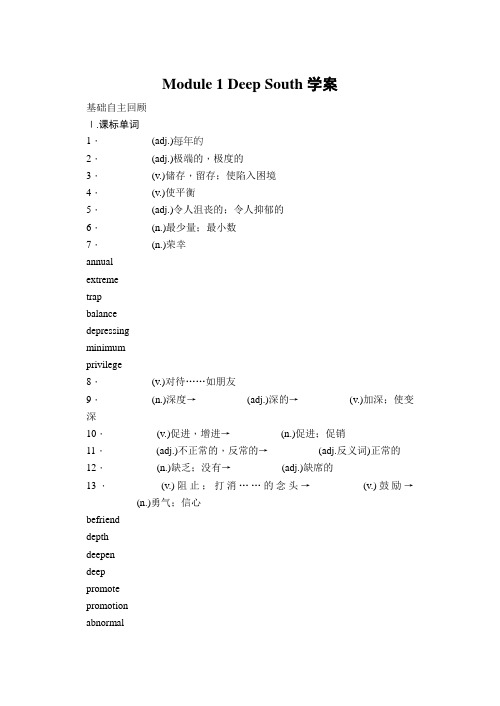
Module 1 Deep South学案基础自主回顾Ⅰ.课标单词1.__________(adj.)每年的2.__________(adj.)极端的,极度的3.__________(v.)储存,留存;使陷入困境4.__________(v.)使平衡5.__________(adj.)令人沮丧的;令人抑郁的6.__________(n.)最少量;最小数7.__________(n.)荣幸annualextremetrapbalancedepressingminimumprivilege8.__________(v.)对待……如朋友9.__________(n.)深度→__________(adj.)深的→__________(v.)加深;使变深10.__________(v.)促进,增进→__________(n.)促进;促销11.__________(adj.)不正常的,反常的→__________(adj.反义词)正常的12.__________(n.)缺乏;没有→__________(adj.)缺席的13.__________(v.)阻止;打消……的念头→__________(v.)鼓励→__________(n.)勇气;信心befrienddepthdeependeeppromotepromotionabnormalnormalabsenceabsentdiscourageencouragecourage14.__________(n.)紧急情况;突发事情→__________(adj.)出现的;新兴的→__________(v.)出现;显现出来15.__________(n.)可靠性→__________(adj.)可靠的→__________(v.)依赖;依靠16.__________(n.)鼓舞;启示;灵感→__________(v.)鼓舞emergencyemergentemergereliabilityreliablerelyinspirationinspireⅡ.常用短语1.____________平均2.____________使适应3.____________以……形式4.____________陷入5.____________引入注目,突出6.____________进入,到达7.____________特别地on averageadapt toin the form ofbe trapped instand outset foot onin particular8.____________进入视野9.____________想出;提供10._______________信守诺言11._____________________阻止某人做某事12.____________如果;假使come into sightcome up withkeep one's promisediscourage sb. from doing sthin case ofⅢ.重点句型1.______________________________________,it is the fifth largest continent in the world.南极洲覆盖了南极圈周围约1,400万平方公里的面积,是世界第五大洲。
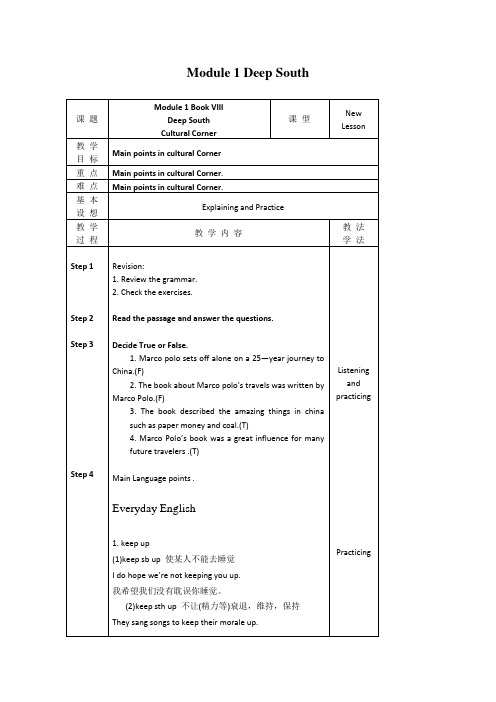
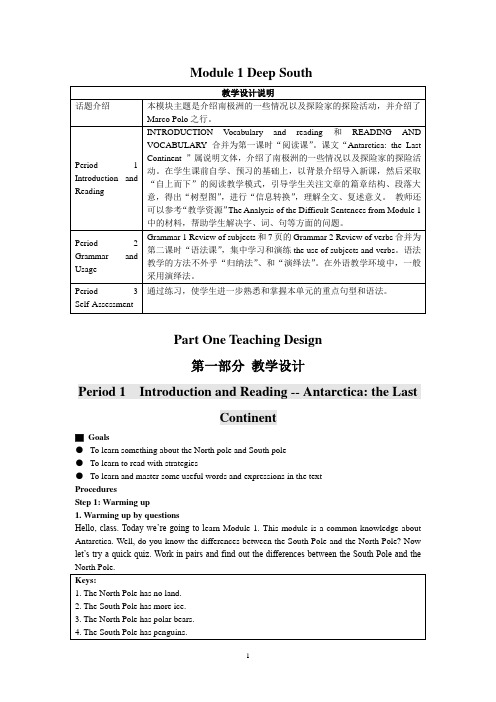
Module 1 Deep SouthPart One Teaching Design第一部分教学设计Period 1 Introduction and Reading -- Antarctica: the LastContinent▇Goals●To learn something about the North pole and South pole●To learn to read with strategies●To learn and master some useful words and expressions in the textProceduresStep 1: Warming up1. Warming up by questionsHello, class. Today we’re going to l earn Module 1. This module is a common knowledge about Antarctica. Well, do you know the differences between the South Pole and the North Pole? Now let’s try a quick quiz. Work in pairs and find out the differences between the South Pole and theBefore we read the text, we should firstly study some new words which appear in the passage.Spelling exercises1. Do you know the ______(一年的) course of the sun?2. The well is ten meters in d______.3. France made a peace t________ with a neighboring country.4. She left her purse on the table as a t_____ of the child’s honesty.5. The house was in a dirty _____(状况)6. The football team was ____(晋升) to the first division.Step 2: Reading1. Reading and find a heading for each paragraph1. Which of the following sentences is WRONG about Antarctica?A. Antarctica is not only the coldest place but also the driest place on earth.B. Antarctica is the fifth largest continent in the worldC. A high mountain range, the Trans-Antarctica range, cuts the continent in twoD. Antarctica holds 70% of the world’s ice and 90% of the world’s fresh water.2. Which of the following descriptions is RIGHT about the wild life in Antarctica?A. There are flying birds, seals, whales and one type of penguins.B. The long Antarctica winter night, the extreme cold and lack of rainfall make few types of penguins.C. There are some trees on the large continent.D. Only two types of flowering plants are found and no forms of algae can grow on ice.3. Antarctica rocks are very important for research because ______.A. the rock has become a window on the pastB. gases and minerals trapped in the rocks can tell us a lot about the weather in the pastC. most of the rocks are meteorites from outer spaceD. most Antarctica rocks are dark in color4. _________crossed the Antarctica Circle in the late 18th century.A. The British explored James CookB. The explorer called NorwegianC. The explorer called CarstensAntarctica is the coldest and driest place in the world. It is technically a _______. It _____ 90% of the world’s ice and most of its fresh water is in a frozen _______. In some places it reaches a ________ of five kilometers.The wildlife in Antarctica has ____ its extreme conditions, but few types of plants can survive there because of the long winter night, the extreme cold and _____ of rainfall.Researchers can get a lot of ________ from the ice, gases, minerals and rocks there. Rocks in dark color which ______ ______ against the white are easy to find and collect.In 1895, a Norwegian called Carstens Borchgrevink became the first man to ____ ___ _____ the Antarctica mainland. Today scientists from many countries travel to Antarctica to study its _________. A spirit of international friendship has replaced the _________. In 1961, 12 countries signed a ________, making Antarctica the world’s biggest nature reserve. Antarctica has becomeStep 4: After reading1. Why is Antarctica an important place?2. Do you think the Antarctica Treaty is a good idea? Why / Why not?3. What might happen to Antarctica if t here wasn’t an international treaty to protect it?4. What other international treaties do you know about ?5. What other international treaties do you think the world needs?Period 2 Grammar and Usage -- Review of subjectsGoalsTo review and master the use of subjects and verbsProceduresStep 1: Review subjects1.主语的定义:主语是一个句子所叙述的主体。
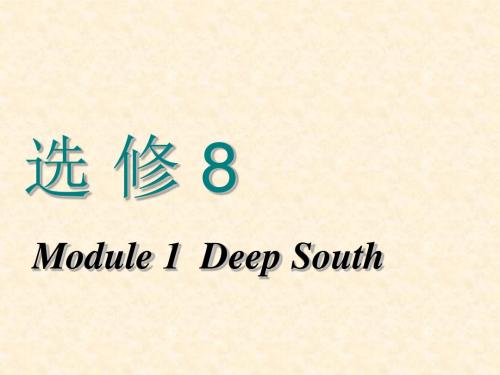
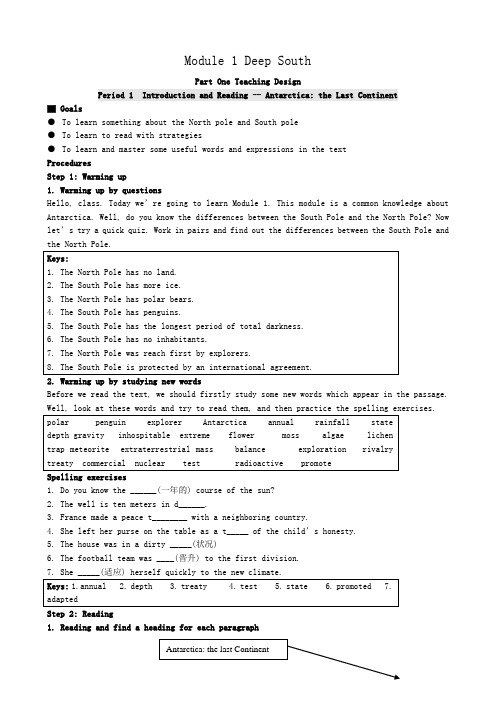
Module 1 Deep SouthPart One Teaching DesignPeriod 1 Introduction and Reading -- Antarctica: the Last Continent▇ Goals●To learn something about the North pole and South pole●To learn to read with strategies●To learn and master some useful words and expressions in the textProceduresStep 1: Warming up1. Warming up by questionsHello, class. Today we’re going to learn Module 1. This module is a common knowledge about Antarctica. Well, do you know the differences between the South Pole and the North Pole? Now let’s try a quick quiz. Work in pairs and find out the differences between the South Pole and the North Pole.2. Warming up by studying new wordsBefore we read the text, we should firstly study some new words which appear in the passage. Well, look at these words and try to read them, and then practice the spelling exercises.Spelling exercises1. Do you know the ______(一年的) course of the sun?2. The well is ten meters in d______.3. France made a peace t________ with a neighboring country.4. She left her purse on the table as a t_____ of the child’s honesty.5. The house was in a dirty _____(状况)6. The football team was ____(晋升) to the first division.7. She _____(适应) herself quickly to the new climate.Step 2: Reading1. Reading and find a heading for each paragraph2. A text organization of Antarctica3. Reading and answering questions1. Which of the following sentences is WRONG about Antarctica?A. Antarctica is not only the coldest place but also the driest place on earth.B. Antarctica is the fifth largest continent in the worldC. A high mountain range, the Trans-Antarctica range, cuts the continent in twoD. Antarctica holds 70% of the world’s ice and 90% of the world’s fresh water.2. Which of the following descriptions is RIGHT about the wild life in Antarctica?A. There are flying birds, seals, whales and one type of penguins.B. The long Antarctica winter night, the extreme cold and lack of rainfall make few types of penguins.C. There are some trees on the large continent.D. Only two types of flowering plants are found and no forms of algae can grow on ice.3. Antarctica rocks are very important for research because ______.A. the rock has become a window on the pastB. gases and minerals trapped in the rocks can tell us a lot about the weather in the pastC. most of the rocks are meteorites from outer spaceD. most Antarctica rocks are dark in color4. _________crossed the Antarctica Circle in the late 18th century.A. The British explored James CookB. The explorer called NorwegianC. The explorer called CarstensD. The explorer called Borchgrevink4. Complete the article with one word in each blankAntarctica is the coldest and driest place in the world. It is technically a _______. It _____ 90% of the world’s ice and most of its fresh water is in a frozen _______. In some places it reaches a ________ of five kilometers.The wildlife in Antarctica has ____ its extreme conditions, but few types of plants can survive there because of the long winter night, the extreme cold and _____ of rainfall.Researchers can get a lot of ________ from the ice, gases, minerals and rocks there. Rocks in dark color which ______ ______ against the white are easy to find and collect.In 1895, a Norwegian called Carstens Borchgrevink became the first man to ____ ___ _____ the Antarctica mainland. Today scientists from many countries travel to Antarctica to study its _________. A spirit of international friendship has replaced the _________. In 1961, 12 countries signed a ________, making Antarctica the world’s biggest nature reserve. Antarctica has become perhaps the most successful symbol of man’s efforts to work together for progress and peace.Step 3: Useful ExpressionsStep 4: After reading1. Why is Antarctica an important place?2. Do you think the Antarctica Treaty is a good idea? Why / Why not?3. What might happen to Antarctica if there wasn’t an international treaty to protect it?4. What other international treaties do you know about ?5. What other international treaties do you think the world needs?。

优质资料---欢迎下载外研版高中英语选修8 第一模块Deep South(Reading & Writing )阅读及写作课教学设计一、教材分析:本模块介绍南极洲的一些情况以及探险家的探险活动,使学生初步了解南极大陆的神秘,发挥对南极的想象,激发热爱科学、克服困难的探险精神。
本课时是本模块的第四课时,主要处理Reading and Vocabulary(2)“How failure became success”(P6-7)的阅读内容,再通过这一阅读的铺垫材料练习一(P6)Ernest Shackleton在1914年《泰晤士报》的一则广告引出写作任务:实用性写作——申请信的写作方法。
阅读材料是一篇典型的信息输入载体,写作被看作是输出的过程。
尝试把传统的阅读课与写作课相结合,本着阅读训练为主,听、说能力为辅,最终以写作为途径,解决一个实际问题。
在这一课时中教学任务的完成过程主要以多媒体课件辅助教学,再以导学案配合教学,分为课前预习、课中导学、课后延展三个部分,力求使学生在学习过程中可以根据教师设计的学案,认真阅读教材,了解教材内容,然后完成相关任务。
在培养学生的自主学习习惯的基础上,教师加以精讲点拨,以达到高效学习的目的。
二、学情分析:本课的教学对象为高中二年级的学生,学生年龄大多在17—18岁,已意识到英语的重要性,非常希望学好英语。
他们通过前几年的学习,已经具备了一定的听说读写能力、自主学习能力和分析理解能力。
但根据高中教学和高考的要求,仍需要进一步的提高,特别是阅读和写作能力。
三、三维目标:1.知识与技能:1)通过各种不同形式的阅读活动,提高学生获取、理解和运用信息的能力及分析问题的能力。
2)掌握申请信的写作方法,完成写作任务。
2.过程与方法:1)通过阅读提高概括和略读、查读能力。
2)任务型教学,掌握申请信的写作方法和技巧。
3.情感态度和价值观:1)通过对阅读材料的理解,激发学生热爱科学、克服困难的探险精神。
Module 1 Deep South(主题语境——人与自然之自然生态:自然地理概况)1.climate n. 气候2.haze n. 雾霾3.mist n. 薄雾4.frost n. 霜5.drizzle n. 小雨;毛毛雨6.breeze n. 微风7.tornado n. 龙卷风8.shower n. 阵雨9.mild adj. 温和的,暖和的10.damp adj.& n. 潮湿(的)11.chilly adj. 寒冷的12.freezing adj. 冻结的;极冷的13.ocean n. 海洋,大海14.continent n. 大陆,大洲15.stream n. 小河;溪流16.range n. 山脉17.valley n. 山谷,溪谷18.desert n. 沙漠19.jungle n. 丛林,密林20.remote adj. 偏远的;偏僻的1.freezing point 冰点2.heat wave 热浪3.weather forecast 天气预报4.average temperature 平均气温5.be separated from... 与……分离6.be located in/lie in 坐落于/位于7.be surrounded by 被……包围/环绕着8.cover an area of... 占地面积为……9.take on a new look 呈现新面貌10.be rich in tourist attractions 旅游资源丰富11.places of interest 名胜古迹12.play an important part in 在……起着重要作用13.range from...to... 从……到……不等1.Firstly, I'd like to tell you something about the weather in my city, which is often windy and very cold in winter.首先,我想给你们介绍一下我的城市的天气,通常多风而且冬天非常寒冷。
英语:Module 1《Deep South》英文教案(2)(外研版选修8)Section 3 Words and Expressions from Module 1 Deep Southstate n. a condition or way of being that exists at a particular time, 状况,状态,情况The building was in a state of disrepair.She was found wandering in a confused state (of mind).Give me the keys –you’re in no fit state to drive.After the accident I was in a state of shock.I came home to an unhappy state of affairs (= situation).The kitchen was in its original state, with a 1920s sink and stove.Everything was in a state of disorder.一切都处于紊乱状态。
The building is in a bad state.那幢建筑物情况很糟。
He was in a poor state of health.他的健康情况不佳。
promote vt. 促进;使晋升为;促销A meeting to promote trade between China and the US was held.促进中美之间贸易的会议召开了。
The instructor was promoted to professor.那位讲师被升为教授。
Do you have any idea how to promote the new product?你知道该如何推销新产品吗?clothing n. 衣服clothing 是衣服的统称,如spring clothing /summer clothing.它是不可数名词如果说一件衣服,应是an article of clothing.food, clothing and shelter 衣食住They were all in summer clothing. 他们都穿着夏天的衣服。
Module 1 Deep South[一积词汇见多识广][课内单词回扣](一)阅读词汇写其义1.emergency n.紧急情况;突发事情 2.mercial adj. 商业的3.ceremonial adj. 仪式性的;正式的 4.befriend v. 对待……如朋友5.insight n. 洞察力,眼光 6.gravity n. 重力,地心引力(二)表达词汇写其形1.state n.状态;状况 2.trap v.储存,留存3.balance v. 使平衡 4.severe adj. 艰难的,艰巨的5.voyage n. (乘船的)旅行,航行 6.privilege n. 荣幸(三)拓展词汇灵活用1.promote vt.促进,增进;提升→promotion n.晋级;促进;提升2.abnormal adj.不正常的,反常的→(反义词)normal adj.正常的*3.explorer n.探险者→explore v.探险;探索;勘探→exploration n.探险;探索;(对某地区的)勘查*4.depth n.深度→deep adj.& adv.深的;深深地→deeply adv.强烈地;深刻地→deepen v.加深;深化*5.extreme adj.极端的,极度的→extremely adv.极端地,极其;非常*6.discourage v.阻止;打消……的念头→discouraging adj.令人沮丧的→discouraged adj.沮丧的→discouragement n.泄气;使人泄气的人(事)→(反义词)encourage v.鼓励7.reliability n.可靠性→reliable adj.可信赖的→rely v.依靠;信赖8.inspiration n.鼓舞;启示;灵感→inspire v.鼓舞;激励→inspiring adj.鼓舞人心的;启发灵感的9.tiresome adj.烦人的,令人讨厌的→tired adj.厌烦的;疲倦的*10.depressing adj.令人沮丧的;令人抑郁的→depress v.使沮丧;使萧条→depressed adj.沮丧的;萧条的→depression n.沮丧;不景气,萧条(期)11.absence n.缺乏;没有→absent adj.缺席的,不在的用上面标注*的单词的正确形式填空1.Many scientists are making great efforts to explore the Moon and other planets.Their exploration may change our future.(explore)2.Some workers work deep into the night just to deepen the small lake to the depth of 6 meters. (depth)3.With the extreme weather ing, people felt extremely cold and many got ill.(extreme)4.On hearing the depressing news, he felt depressed and soon got into a state of depression.(depress)5.From his discouraged look, I judged he wasn't hired, which was really discouraging. But I still encouraged him to go to other panies to try his fortune.(encourage)[话题单词积累]1.weather/'weðə/ n.天气2.climate/'klaImət/ n. 气候3.haze/heIz/ n. 雾霾4.mist/mIst/ n. 薄雾5.fog/fɒɡ/ n. 雾6.frost/frɒst/ n. 霜7.drizzle/'drIz(ə)l/ n. 小雨;毛毛雨8.breeze/briːz/ n. 微风9.rainbow/'reInbəʊ/ n. 虹,彩虹10.rainfall/'reɪnfɔːl/ n. 一场雨;降雨量11.shower/'ʃaʊə/ n. 阵雨;淋浴12.storm/stɔːm/ n. 风暴,暴(风)雨13.thunder/'θʌndə/ n.& vi. 雷声;打雷14.blow/bləʊ/ vi. 吹15.freeze/friːz/ vi. 结冰;使冻住16.pour/pɔː/ vi. 倾泻,不断流出17.mild/maIld/ adj. 温和的,暖和的18.damp/dæmp/ adj.& n. 潮湿(的)19.foggy/'fɒɡI/ adj. 有雾的20.cloudy/'klaʊdI/ adj. 多云的,阴天的21.sunny/'sʌnI/ adj. 晴天的;晴朗的22.freezing/'friːzIŋ/ adj. 冻结的;极冷的23.snowy/'snəʊI/ adj. 下雪的24.chilly/'tʃIlI/ adj. 寒冷的25.geography/dʒI'ɒɡrəfI/ n. 地理26.ocean/'əʊʃ(ə)n/ n. 海洋,大海27.continent/'kɒntInənt/ n. 大陆,大洲28.stream/striːm/ n. 小河;溪流29.range/reindʒ/ n. 山脉30.valley/'vælI/ n. 山谷,溪谷31.desert/'dezət/ n. 沙漠32.jungle/'dʒʌŋɡ(ə)l/ n. 丛林,密林33.research/rI'sɜːtʃ/ n. 研究34.expedition/ekspI'dɪʃ(ə)n/ n. 探险队35.adventure/əd'ventʃə/ n. 冒险36.challenge/'tʃælIn(d)ʒ/ n. 挑战[二积短语顿挫抑扬][课内短语回扣](一)根据汉语写出以下短语*1.be_fond_of 喜欢*2.in_case_of 如果;假使;以免3.stand_out 杰出;突出;引人注目*4.adapt_(to) (使)适应5.e_into_sight 进入视野,出现在眼前*6.e_up_with 想出*7.set_foot_on 进入,到达,踏上*8.keep_one's_promise 信守诺言(二)用上面标注*的短语完成以下句子1.When you keep_your_promise,_no matter how much effort it takes, you will be rewarded.2.They were filled with joy when they set_foot_on China soil in late July.3.If you know first aid methods, you can be calmer and more helpful in_case_of emergency.4.Since people are_fond_of humor, it is as wele in conversation as anywhere else.5.Having discussed the problem all afternoon, they finally e_up_with a solution to it.6.If plants were moved from one habitat to the other type of habitat, they changed their appearance and adapted_to the new environment.[话题短语积累]1.zero degrees centigrade 零摄氏度2.50 degrees Fahrenheit 50华氏度3.freezing point 冰点4.heat wave 热浪5.average temperature 平均气温6.weather forecast 天气预报7.subtropical climate 亚热带气候8.under the weather 身体不适;在恶劣天气条件下9.rain or sunshine 风雨无阻10.be rich in 富含;盛产11.be separate from ... 与……分离12.be located in/lie in 坐落于/位于13.be surrounded by 被……包围/环绕着14.cover an area of ... 占地面积为……15.take on a new look 呈现新面貌16.off the coast of ... 在……海岸附近17.at the top/foot of ... 在……的顶部/底部(脚下)18.to/on/in the south of ...在……的南面(相望/接壤/在内)[三积句式写作扮靓][课内句式仿写]1.not until 置于句首的部分倒装句[例句] Not until the late 18th century did the British explorer James Cookcross the Antarctic Circle, but he never saw land.[仿写] 直到他面试失败,他才意识到自信是多么重要。
Module 1Deep South教学设计Period Ⅰ(第一节)Introduction & Reading and V ocabulary (1)教学目标:了解神秘的南极大陆。
教学重点:学习和初步运用有关词语,回答有关南极大陆的各种问题。
教学难点:通过阅读提高概括和略读、查读能力。
Step1: Lead-inIt is well-known to all that seven continents exist on the earth. Which one was the last continent to be discovered? (Antarctica)It is its unique natural features and scientific research value that attract interests of many tourists, explorers and scientists. As the exploration goes on, people know more and more about Antarctica. How much do you know about it? Ok, let’s have an Antarctic general knowledge quiz.①which month is the coldest month in Antarctica?(September, July, December )②Generally a penguin weighs about .(1 kg, 5 kg, 50 kg )③The China Great Wall Station was founded .(in 1985, in 1989)④The blood colour of fishes in Antarctica is .(brown, red, blue, white)⑤What is the southernmost point of The Earth?(the south pole /deep south)Opposite the south pole is the north pole. what are the similarities and differences between the north pole and the south pole?Let’s go on with the quick quiz.Step2: Introduction Activity 1Step3: Reading and V ocabulary (1)Since Antarctica is so fantastic, why not learn more details about it through reading?1.Text analysisPeriod Ⅱ(第二节)Language points in Introduction & Reading and vocabulary (1) Language Points in Introduction1. polar adj.(1)(南、北)极的,地极的,近地极的e.g. the polar regions(2)磁极的e.g. polar attraction 极向引力2. pole n. 地极e.g. the North/South Pole3. quiz [c] 竞赛,比赛(尤指电视或电台中人们竞相回答问题以测验其知识者)e.g. take part in a quiz, a sports/music/general knowledge quizvt. 问某人问题e.g. quiz sb about sb/sth4. explore vt(i) (1)探险(测),考察e.g. explore the Arctic regions, explore the new continentvt. (为测试或了解)仔细检查,探索(究)e.g. explore the solution to the problemn. explorationn. explorerLanguage Points in Reading and V ocabulary1. range: (1) (山、丘等)连贯而成的脉,排, 列, 行e.g. a mountain-range(2)成套或成系列的东西、种类e.g. a range of tools/foods, have a wide / narrow range of interests, hobbies(3)限度,范围e.g. This subject is outside my range.2. imagine vt. 想像,设想imagine (1)that: Imagine that you are a university student.(2)sb/sb’s doing sth: imagine me/my doing it(3)sb/sth+(to be)+adj.: imagine her to be beautiful(4)sb/sth + as + n.: imagine him as a tall man(5)doing sth3. adapt vt. (1)adapt sth for sth 使某事物适合新的用途、情况等/修改某事物This machine has been specially adapted for use underwater.这机器是为水下使用而特别改装的。
⎪⎪第一部分教材复习选修8[话题素材]好词1.adventure n . 冒险,奇遇 2.adventurous adj . 有冒险精神的 3.attractive adj . 吸引人的 4.continent n . 大陆 5.penguin n . 企鹅 6.the South Pole 南极7.be covered with/by 被……覆盖 8.in the wild 在野外 9.freezing cold 极冷的10.be surrounded by 被……所围绕 11.scientific investigation 科学考察 12.green house effect 温室效应 13.global warming 全球变暖14.a world of ice and snow 一片冰天雪地15.be unfavourable to human survival 不利于人类生存 佳句1.Antarctica is_covered_with solid thick ice and deep snow. 南极被厚厚的冰雪覆盖。
2.Are there any animals in the polar circles? 南极圈和北极圈内有动物存在吗? 3.Antarctic is the_earth's_coldest landmass. 南极洲是地球上最冷的大陆。
[精美语篇]Welcome to the Bottom of the World 南极大陆——世界最后的净土Antarctica is the highest, driest, and coldest place on Earth. It is also the remotest, which accounts for its unspoiled environment. It is difficult for people to get there, and not a comfortable place for people to stay once they arrive. It is widely described as the last truewilderness on our planet.Though no human population isnative to Antarctica, about 1,000 people work there in the summer months, and another 12,000 tourists visit it every year. They come to enjoy the unspoiled environment, the bright blue skies, and the fresh white snow fields.Yet, Antarctica's fragile and complicated eco-system is threatened by its human visitors. Damage to the environment occurs as people come looking for resources beneath the ice, or carelessly leave their garbage behind. Currently, countries are working to ensure that the damage to Antarctica's environment is minimized, and that the last wilderness on Earth will remain an unspoiled place.高频单词1.balance (n.& v.) (使)平衡→balanced (adj.) 平衡的2.trap (v.) 储存,留存→trapped (过去式)→trapped (过去分词)3.privilege (n.) 荣幸,特权4.extreme (adj.) 极端的,极度的→extremely (ad v.) 极其5.voyage (n.) (乘船的)旅行,航行6.severe (adj.) 艰难的,艰巨的→severely (ad v.) 严重地7.state (n.) 状态;状况(v.) 陈述,声明→statement (n.) 陈述,声明→statesman (n.) 政治家8.promote (v.) 促进,增进→promotion (n.) 晋升;晋级→promotive (adj.) 增进的;提升的9.discourage (v.) 阻止;打消……的念头→encourage (反义词)(v.) 鼓励→courage (n.) 勇气→discouraged (adj.) 感到泄气的→discouraging (adj.) 令人泄气的10.depth (n.) 深度→deep (adj.) 深的→deeply/deep (ad v.) 深深地→shallow (反义词)(adj.) 浅的11.abnormal (adj.) 不正常的,反常的→normal (反义词) (adj.) 正常的12.absence (n.) 缺乏;没有→absent (adj.) 缺席的,不在场的→present (反义词) (adj.) 在场的,出席的→presence (n.) 出席13.depressing (adj.) 令人沮丧的;令人抑郁的→depressed (adj.) 忧伤的,沮丧的→depress (v.) 使沮丧→depression (n.) 沮丧,(意志)消沉14.reliability (n.) 可靠性→rely (v.) 依靠,依赖→reliable (adj.) 可靠的;可信赖的15.inspiration (n.) 鼓舞;启示;灵感→inspire (v.) 鼓舞,鼓励→inspiring (adj.) 令人鼓舞的→inspired (adj.) 受鼓舞的;有灵感的重点短语1.set_foot_on进入,到达2.stand_out突出3.in_the_form_of以……的形式4.in_case_of如果;假使5.adapt_to(使)适应6.as_a_result结果;因此7.keep_one's_promise信守诺言8.come_up_with想出9.take_a_risk冒险10.in_particular特别,尤其热点句型1.the+序数词+(n.)+to do...“是第……做什么的……”France was one of the_first_countries_to_sign the Antarctic Treaty.(教材P2)法国是第一批签《南极洲公约》的国家中的一个。
2.It is+adj. +to do “it”是形式主语,to do是真正的主语It_is_difficult_to_imagine a more inhospitable place.(教材P2)想象一个更荒凉的地方是很难的。
3.only+n.不用倒装句Only_two_types_of_flowering_plants are found.(教材P2)只有两种开花植物被发现。
4.not until 置于句首,主句采用倒装Not_until the late 18th century did the British explorer James Cook cross the Antarctic Circle, but he never saw land.(教材P3)直到18世纪末,英国探险家詹姆斯·库克才穿越了南极圈,但他却始终未发现任何陆地。
5.It takes/took sb. +some time +to do sth. “做……花费某人多长时间”It_took_Shackleton_17_days_to_reach_South_Georgia.(教材P7)到达南佐治亚洲花费了沙克尔顿17天的时间。
教材复现在空白处填入适当的内容(1个单词)或括号内单词的正确形式。
1.It's ________ extremely dangerous place.答案:an2.France was one of the first countries ________ (sign) the Antarctic Treaty.答案:to sign3.Antarctica holds 90% of the world's ice, and most of ________ fresh water (70%) is in a ________ (freeze) state, of course.答案:its; frozen4.Gases and minerals can tell us a lot about ________ the world's climate was like in the past ages.答案:what5.Since most Antarctic rocks are dark in colour, they stand out ________ the white background and are easy to identify and collect.答案:against6.Today countries ________ (represent) 80% of the world's population have signed the treaty.答案:representing7.When Europeans discovered the continent of America in the 15th century, the great age of ________ (explore) began.答案:exploration8.We discourage you from ________ (smoke) except in specific areas.答案:smoking9.It's ________ privilege, not a right ________ (come) to this extraordinary place.答案:a; to come10.It's ________ (possible) the calmest place on Earth.答案:possibly1state n. 状态;状况;国家;政府;州v. 陈述;声明Antarctica holds 90% of the world's ice, and most of its fresh water (70%) is in a frozen state, of course.(P2)南极洲拥有世界90%的冰,当然其大部分淡水(70%)都处于一种冰冻状态。